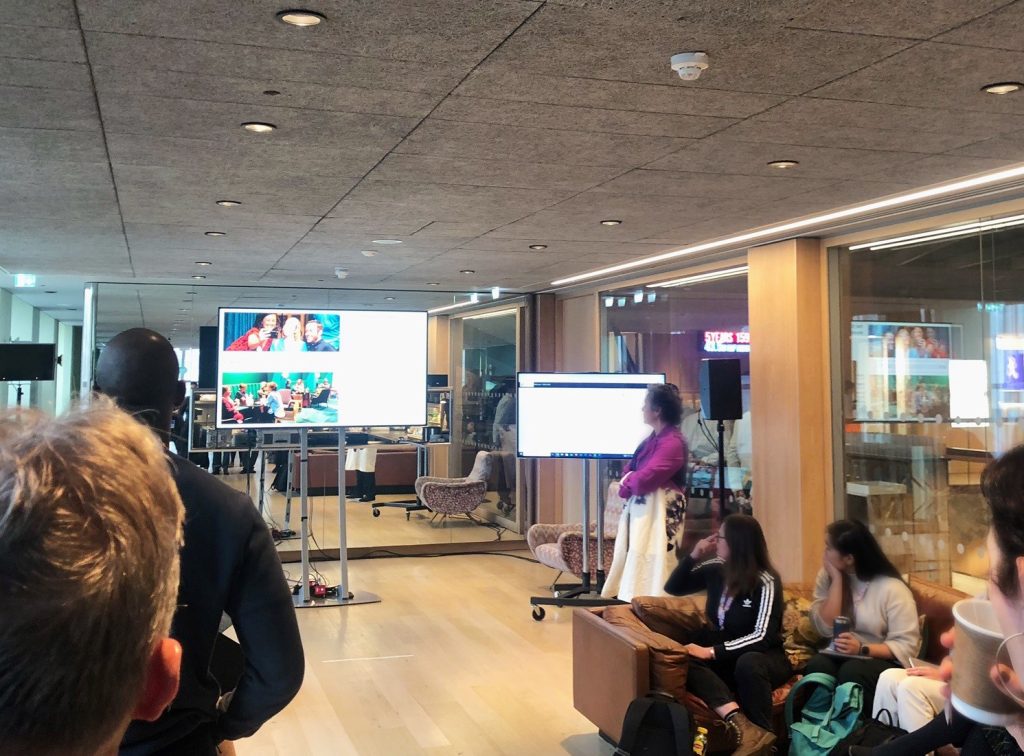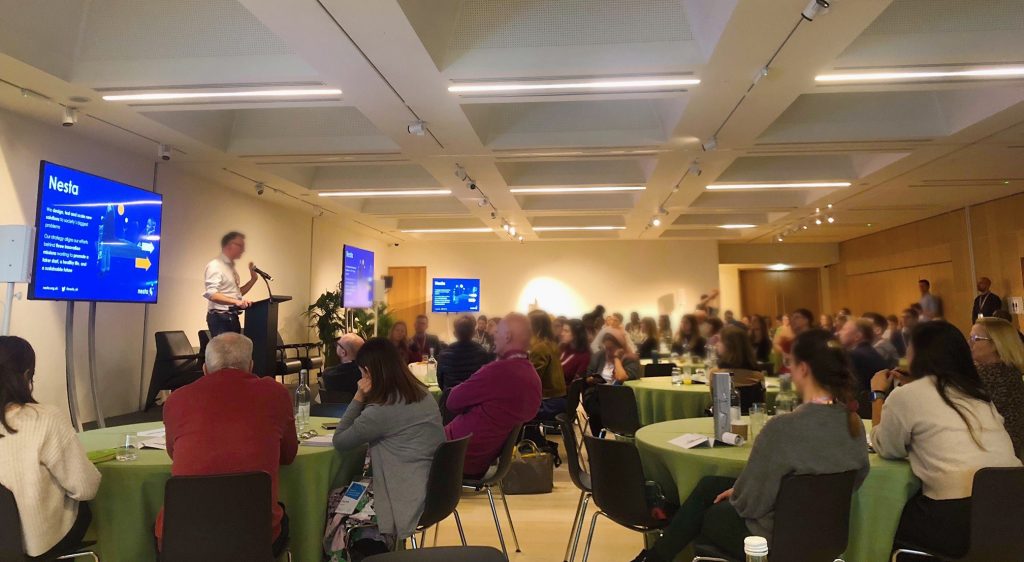
Helen Apsey, Policy Lead for the AHRC Creative Communities programme, took part in the Wellcome Policy Lab Festival, held on 13 February 2024 at the Design Museum in London. Here Helen shares some of the highlights and learnings from the day.
The Wellcome Policy Lab Festival, held at the Design Museum and led by Head of Policy Lab Martin Smith, was an immersive day that gave cross-sector policymakers the opportunity to experience the exciting approaches that Wellcome is developing with its partners to make policy-making more collaborative. As a programme with co-creation at its heart, the AHRC Creative Communities team were delighted to be invited to participate and to learn more about Wellcome’s new co-creation developments. Through collaborative working, co-creation methods, and innovative approaches to policy and research, our programme seeks to unlock potential and empower communities to explore how culture can address regional inequality, develop solutions to future challenges, and help level up the UK, and we welcome opportunities to learn, expand our knowledge and experience best practice from other approaches.

The Wellcome approach to policy making has always been to partner with projects that inspire creativity, using new tools and methods and exploring how these can generate different policy insight and maximise impact. The projects showcased at the festival included storytelling that mobilised many different forms, removing barriers to participation, managing expectations and ensuring that multiple voices are heard as a key part of the policy-making process.
Thumbi Labs’ workshop used the medium of storytelling to encourage participants to share and listen to each other’s experiences on a policy-related theme. We were grouped into eight teams, with one listener in each team stationed at our base, and everyone else going round the room, telling short stories on the policy-related themes to all the listeners. The themes were community, safety, health and transport, and tellers received a token for each story, which we added to a central board for each team. The goal was to get the most tokens. This quickly built connections between teller and listener, sharing insights and feeling heard, and getting participants to think on their feet to identify stories from their lives to share. The facilitators explained in the lab debrief how they used this person-centred gamification approach to ensure the participation of people with lived experience in the policymaking process, remove facilitator bias, cut across barriers of literacy, language and socio-economic status, and to build understanding of these perspectives among local policymakers.

Monash University’s workshop on The Tomorrow Party asked participants to imagine themselves in future policy-related scenarios – two years, five years, and ten years from now. Using the format of a quick-fire game, each participant had to find a succession of three partners, to talk to and reflect with for the different future phases, each taking turns as questioner and imaginer. The facilitators explained that living temporarily in the future would enable participants to co-create an experience and to picture what was possible, without seeing the barriers to achieving these goals, and to break them out of their usual day-to-day planning. This workshop created informal spaces for discussion and spontaneous connections, and made us think on our feet to discover new insights to policy-related issues.
The Red Cross Red Crescent Climate Centre’s zoom-led session explored humour as a vehicle for policy discussions through games and cartoons that encouraged participants to engage with one another and explore what they thought of when they thought of humour. We were asked to consider what was funny in the cartoons that were shared, what made us stop and think, and how humour could help to build connections around serious policy issues, provide cut-through and encourage people to engage seriously with policy emergencies. The session offered a fascinating insight into how Red Cross Red Crescent have used innovative approaches to engage, create new ideas, foster collaboration and reshape policy dialogues on the mental health impacts of climate change. It offered insight into how ‘serious fun’ could disrupt usual ways of thinking and create action and change.
Nesta’s Minister for the Future session explored long-term policy thinking. Participants worked in a model-UN style format that encouraged us to interrogate big issues and create our own policy approaches to them, no matter how unfeasible they might seem. Our table chose to interrogate how to get the UK to Net Zero by 2030, and how to face up to the opportunities and challenges this would create.
The festival closed with a panel discussion with workshop facilitators, chaired by Martin Smith of Wellcome, that included interactive questions we could access through our phones to participate. Alongside this interactive element, panel members reflected on the purposes behind their sessions, spoke about the vital role of creativity in policymaking and how each of their approaches, in their very different ways, aimed to remove barriers to participation, create new ways of finding solutions, and encourage collaboration.

This was such an interesting and meaningful day to be a part of, to experience diverse facilitation styles, understand the motivations behind the different sessions, and encounter a range of methods for policy work. It felt very relevant to our own work on the AHRC Creative Communities Programme, as we run a Policy Lab series across the UK in 2024, with themes on health and wellbeing, the environment, civic identity, education and skills, and pride in place. The labs will harness co-creation processes to unite a diverse range of cross-sector stakeholders around a series of key challenge areas in R&D, to capture key thinking, generate new solution suggestions and connect the different policy contexts of the devolved regions and nations. It was inspiring to see the creative methodologies Wellcome and partners are developing in light of our own focus, and to come together as many diverse actors who are part of a broader landscape championing the vital role co-creation has in levelling up.
You can find more information about Helen Apsey, our Policy Labs and other policy research work across the AHRC Creative Communities website.
Brought to you by


